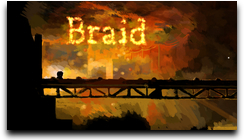 XBLA offers great opportunities for the indy developer but everything comes at a price. Over the last three years Braid‘s developer Jonathan Blow spent a reported $180,000 to create the popular Braid title on Xbox Live. He’s going to need a lot more sales before he can celebrate the highly valued, highly reviewed title.
XBLA offers great opportunities for the indy developer but everything comes at a price. Over the last three years Braid‘s developer Jonathan Blow spent a reported $180,000 to create the popular Braid title on Xbox Live. He’s going to need a lot more sales before he can celebrate the highly valued, highly reviewed title.
The Independent Games Festival was kind to him, giving him the “Innovation in Game Design” back in 2006, since then he’s put his money where is mouth is; his own money. There are good times and bad times when you’re discovering your dreams. The reviews surely made him feel great about the work he has done over the last three years but a review won’t pay the bills.
It may be a hard road ahead for Jonathan, hopefully at least breaking even on the project. Although he may not look back at the game as a financial success we can only imagine he’ll have a lot easier time getting funding or publishing for his next title, if that’s the path he chooses.
(Thanks, Kotaku)

0 thoughts on “XBLA’s Braid Needs More Sales”